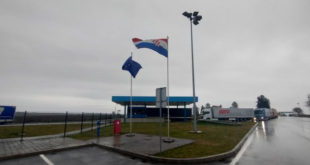The International Court of Justice, ICJ, has set a deadline of December 20, 2010, for Croatia to submit its response to Serbia’s genocide countersuit.
At the same time, the ICJ set a deadline of November 2011 for Serbia to reply to Croatia’s response.
The decision, which was made available to the public today, dates from February 4.
Croatia filed genocide charges against Serbia at the ICJ in 1999, demanding that Belgrade punish all perpetrators of war crimes, return cultural property to Croatia and pay for war damages.
Serbia filed a countersuit against Croatia for genocide on January 4, 2010.
The two lawsuits have contributed to already tense relations between Serbia and Croatia.
Serbian President Boris Tadic, speaking after the countersuit was filed, said that Serbia had been forced to file it, but that “it would have been better had justice for the victims been obtained in regular judicial proceedings.”
“I’m deeply convinced there is a political and legal space for the withdrawal of the suit and countersuit,” he added. “We want to avoid confrontation between the [two] states, which is in no one’s interest.”
Newly elected Croatian President Ivo Jospivoic recently said that, while he was hopeful that relations between Belgrade and Zagreb would improve, it was too early to talk about withdrawing the cases.
In its countersuit, Serbia claims that Croatia is responsible for genocide against Serbs committed in August 1995 during the military operation known as “Storm”.
Serbia claims that Croatia is responsible for killings, causing serious bodily or mental harm, and “deliberately inflicting on a group living conditions calculated to bring about its partial physical destruction.”
The countersuit also includes charges that Croatia violated its “obligations under the Convention on the Prevention and Punishment of the Crime of Genocide by conspiring to commit genocide against the part of the Serb national and ethnical group living in the Krajina Region (UN Protected Areas North and South) in Croatia.”
At the same time, Serbia argues that Croatia did not punish those responsible for the crimes. As such, Serbia requests that Croatia immediately take steps to punish perpetuators, and pay full compensation to victims.
It also asks that Croatia establish “all necessary legal conditions and a secure environment for the safe and free return” of refugees, and to ensure conditions for a “peaceful and normal life, including full respect for [the refugees’] national and human rights.”
Serbia is also asking that Croatia remove its August 5 holiday called the Day of Victory and Homeland Gratitude and the Day of Croatian Defenders, which Serbia considers to be “a day of the triumph in the genocidal operation “Storm”, from its list of public holidays.
In its last decision, ICJ concluded that it was “appropriate” to give Croatia the opportunity to express its opinion on these claims.
The ICJ is a UN body whose role is to settle, in accordance with international law, legal disputes between states which are submitted to the court and to give opinions on legal questions.
From May 22, 1947, when the court was established, until February 19, 2010, the ICJ handled 146 cases.
 Eurasia Press & News
Eurasia Press & News


